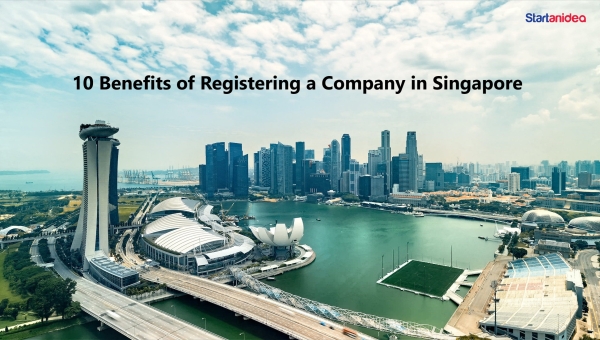Have you ever thought about where to launch your new business startup? Canada is known for its robust economy and social conditions, favorable environment, and a land with vast opportunities. It makes it an apt choice to setup a company in Canada in 2025. Given below are seven persuasive reasons that suggest why Canada is the ideal country to look at for starting a new business or expanding a current business.
Why Start a Business in Canada?
Canada consistently ranks among the top countries for ease of doing business, thanks to its stable political environment, strong economy, skilled workforce, and access to global markets.
Top 7 Reasons Why Setup a Company in Canada in 2025
Below are some of the compelling reasons that may influence your decision in establishing a company in Canada in 2025. They are:
- Strong Economic Foundation
It has been evident that Canada has a strong and flexible economy that makes the country suitable for business ventures. According to data as of 2025, there is a consistent increase in the country’s Gross Domestic Product while the forecasts continue to portend financial stability. According to the WTO, the real GDP of Canada in 2023 was $2.14 trillion, thus revealing the economic strength of the country in the international markets.
- Favorable Business Environment
Establishing a company in Canada is quite easy, given the favorable business environment of the country. According to the World Bank information, Canada, with an overall score of 81 from 100, can be considered the third country in the world with the least bottlenecks in the process of business creation, with great attention to the efficiency of the legal framework. Some of the factors that shareholders like about this environment include low threshold industries, smooth flow of processes on business incorporation and an environment that fosters innovations.
- Access to Global Markets
The geographical location of Canada makes it the most favorable nation for business people to invest in. It connects both North American and international territories. International business in Canada has increased through FTA as seen with USMCA and CETAs free trade agreement which Canada uses to unlock more markets and lower tariffs globally.
- Innovation Hub
Canada is also a country that has a particularly favorable environment for business development with an emphasis on such sectors as technology, biotechnology, and renewable energy. Major startup hubs such as Toronto, Vancouver, and Montreal are widely-recognized cities with a thriving startup culture to source talent and funding from. As per the statistics, the venture capital investments made in the startups of Canada in the year 2023 was CAD 8.5 billion, what’s clear is that the country is indeed a technology and innovation destination.
- Skilled Workforce
Canada has a rich source of educating their human capital coupled with skills and diversity that suits the current volatile economic market. The highly developed academic and professional education in the country guarantees that there will always be availability of skilled personnel in areas such as engineering, information technology, accounting and finance, and healthcare. As of 2023, the unemployment rate in Canada reduced to 5.6 %, showing readiness of skilled professionals willing to offer their expertise in enhancing business performance in the Philippines.
- Quality of Life
There are social benefits of moving to Canada for business people, these include; Good living standards. Canada is a secure country, healthcare is accessible to all citizens and the country is clean. Studies show that some of the most livable cities in the world are in Canada. This makes the standards of living in the country good, thus encouraging talent attraction due to challenges that the employees are ready to accommodate here. Toronto and Vancouver placed among the ten best cities to live in, showcasing their prospects as cities for business and living.
- Supportive Government Initiatives
The Canadian government plays a major role for business development and through various measures and stimuli. Other incentives are a taxation measure where governments encourage spending on R&D through tax credits like the Scientific Research and Experimental Development (SR&ED) tax credit. Finally, there are more limited funds for granting and they cover the financing of startups, small businesses and support the spirit of entrepreneurship and economic development all across the country.
Step-by-Step Guide to Setting Up Your Company
Here, we give a basic guide on how to set up your company from registering a business name to hiring employees.
- Conduct Market Research
It is imperative to undertake research before engaging in the registration process; the probability of success depends on the recognition of one’s target market and competitors. This will enable you to avoid making wrong decisions in your business until you have a well formulated business strategy.
- Choose a Business Name
One of the critical aspects of naming a business is making sure that the name selected is not only unique but also easy to remember. Make sure it adheres to the Canadian naming policy and try to search for its availability with the official Canada business name registration database.
- Register Your Business
It also partly depends on your chosen legal structure; you will either need to register your business with the provincial or territorial government. For example:
- Federal Incorporation: If your business you want to establish it on a nationwide or internationally basis it may Incorporate federally through the Corporations Canada.
- Provincial Registration: In case you choose to register a sole proprietorship business, partnership, or a provincial corporation, it is registered at either the provincial or a territorial level (for instance, Ontario Business Registry).
- Obtain all Permits and Licenses
There are various business activities in Canada that can only be conducted with permission, commonly regarded as permits/ licenses. Make yourself familiar with the rules and regulations that are required from federal, provincial, and municipal level, related to your type of business.
- Register for Taxes
Appropriate and acquire for a business number BN on the CRA and register the taxes like GST/HST, Payroll deductions, and corporate income tax.
- Open a Business Bank Account
Open a business bank account This means that to avoid mixing up your money with that of your business, you need to open a new account specifically for business. This will help to enhance and bring about efficiency in the accounting and the financial side of things.
- Comply with Employment Standards
Before considering hiring employees, one needs to understand the federal and provincial government regulations concerning wages, working hours, and safe working conditions at the place of work.
- Protect Your Intellectual Property
It is advisable to register your business or organization name, brand name or inventions to avoid trademark infringement in Canada and possibly in other foreign countries.
Conclusion
From this analysis it can, therefore, be concluded that Canada presents an attractive opportunity to set up a company in 2025. This environment remains the right context to set and execute business strategies. No matter if it’s the dynamic setting of Toronto for a tech-oriented start-up, or if it’s a green-tech initiative in sunny Vancouver – Canada is a perfect place to turn your start-up dream into reality thanks to its favorable environment and superb quality of life. If you are really confused from where to start, Start an Idea is right there for you. We will assist you in providing more information about how to begin your small business in Canada and how you benefit from the market in this country.
Also Read: Benefits and Problems of Registering a Company in Canada in 2025






